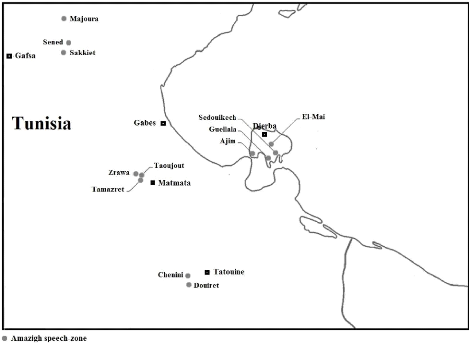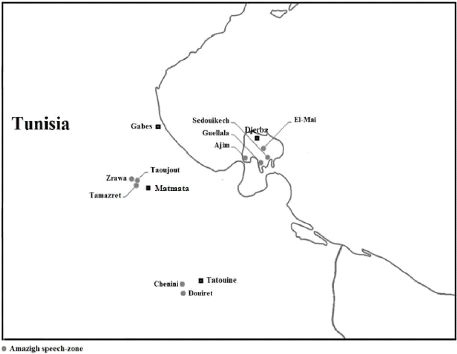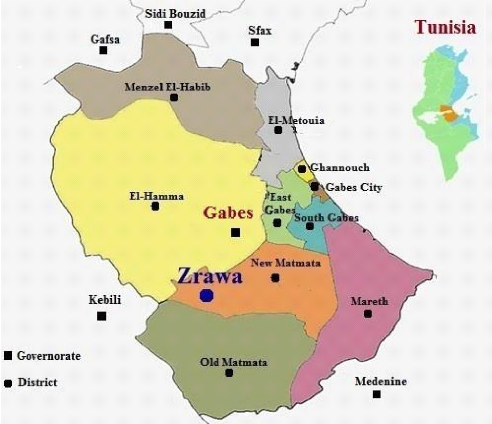Section I: Please answer the following questions.
1. What is your name? ....
2. How old are you? years old.
3. What is your occupation?
4. What is your first language?
5. What languages do you speak? Please list all languages
spoken.
6. If you are married, is your spouse/partner Amazigh?
1. Yes
2. No
If `No', what group does she/he belong to?
Section II: For each of the following statements, please
circle whether you Strongly Agree, Agree, Neutral, Disagree, or Strongly
Disagree.
1. I am proud of being a speaker of Amazigh.
1. Strongly Agree
2. Agree
3. Neutral
4. Disagree
5. Strongly Disagree
2. It is necessary to maintain the Amazigh language.
1. Strongly Agree
2. Agree
3. Neutral
4. Disagree
5. Strongly Disagree
3. Imazighen have the right to speak Amazigh in the presence
of those who do not understand it.
1. Strongly Agree
2. Agree
3. Neutral
4. Disagree
5. Strongly Disagree
4. My ties with Tunisian Arabic are weaker than my ties with
Amazigh.
1. Strongly Agree
2. Agree
3. Neutral
4. Disagree
5. Strongly Disagree
HERITAGE LANGUAGE MAINTENANCE AMONG THE BERBERS 82
5. The Amazigh language is the most salient marker of Amazigh
identity.
1. Strongly Agree
2. Agree
3. Neutral
4. Disagree
5. Strongly Disagree
6. Speaking the Amazigh language is a prerequisite for being
Amazigh.
1. Strongly Agree
2. Agree
3. Neutral
4. Disagree
5. Strongly Disagree
7. If someone talks to me in Tunisian Arabic, I should answer
him in Tunisian Arabic.
1. Strongly Agree
2. Agree
3. Neutral
4. Disagree
5. Strongly Disagree
Section III: Please circle the appropriate answer.
1. Whom do you use Amazigh with? Circle the appropriate
one(s).
Grandparent(s) - Parents - Aunts/ Uncles - Siblings - Cousins -
Children - Nephews/Nieces-Anyone who speaks Amazigh - None
2. Are you against the abandonment of the Amazigh language
by its speakers?
1. Yes
2. No
3. Would the loss of the Amazigh language result in the loss
of the Amazigh identity?
1. Yes
2. No
HERITAGE LANGUAGE MAINTENANCE AMONG THE BERBERS 83
Appendix B. The Arabic Version of the
Questionnaire
: Î
íÑÇÊáÇ
ÉíÛ
íÒÇ
ãáÇ
ÉÛááÇ áæÍ
ÉÑ
ÇãÊÓÅ
íáÇÊáÇ
ÉáÆÓáÇ äÚ
ÉÈÇ
ÇÌÑáÇ :
áæáÇ
ãÓÞáÇ
É
ßÑãÚ ãß .1
Ç Á
퇁
ãÓáÇÇ .2
ÊÏáæ äí .3
ÉäåãáÇ .4
ìáæáÇ
ßÊÛá íå Çã .5
|
.Çåáß
|
ÇåÑßÐ ÁÇ
|
ÌÑá Ç Ç å
|
äíãáßÊÊ\Çå
|
ãáßÊÊ
|
íÊáÇ ÊÇ
|
󇇂
|
íå
|
Çã .6
|
ÛíÒÇãáÇ
äã
ã
áå
äíÑÞáÇ
ÉÌæÒÊ
Ì
/ Ç
æÒÊã Êäß
ä
.
ÇÐÅ .7
ãÚ
áÇ
áÇ
ÉÈÇ
ãÞ
:
í
äÇËáÇ
.È
ÊäÇß ÇÐÅ
ãÓÞáÇ
Ç
퇁
í
: ÈÓ
ÇäãáÇ
ÑÇ
å / æå ÞÑÚ í
äã
É ÑÆÇÏ
ÚÖæÈ
íÊÎáÇÇ
áæÍ
. ÉíÛí
|
ÒÇ
|
ãáÇ
|
ÉÛááÇÈ
ÞØÇä íäæßÈ
|
ÑÎÊ .1
|
|
ÉÏ
|
ÔÈ
|
ÞÇæ .1
|
ÞÇæ .2
ÖÑÇÚ .4
ÇãáÇ
.ÉíÛíÒ
ÍãáÇ
ÉÏ
ÔÈ
íÑæÑÖáÇ
ÉÛááÇ
ìáÚ ÉÙÇ
äã .2 ÞÇæ .1
ÞÇæ .2
ÖÑÇÚ .4
.ÉÛááÇ
äæãåí
áÇ äí
? ÉÑÖÍ í
ÉíÛí
ÒÇãáÇ
ÉÛáá
ÇÈ ËÏ

ÐáÇ
Áá
ÇÄ
ÉÏ
ÔÈ
ÞÇæ .2
ÖÑÇÚ .4
íÞáÚÊ
äã
? ÚÖÇ
ÉíÓäæÊáÇ
ÉÏ
Ê .4
Çæ .1
ÔÈ
íÈÑÚáÇÈÉ
.ÉíÛí
ÒÇãáÇ
ÞÇæ .2
ÖÑÇÚ .4
ÉÏ
ÔÈ
ÖÑ ÇÚ
.5
áíáÏ
Éíæ
íÛ
í
.ÉíÛí
ÒÇãáÇ
ÒÇãáÇ
ÒÑÈ
ÉÏ
ÉÛááÇ .5
ÞÇæ .1
åáÇ
ìáÚ
ÞÇæ .2
ÛíÒÇãáá .3
ÞÇæ .1
ÖÑÇÚ .4
HERITAGE LANGUAGE MAINTENANCE AMONG THE BERBERS 84
Ú
.5
ÖÑÇ
ÒÇãáÇ
Ç
.
íáÚ
íÓäæÊá
ÏÑ É
ÇåÈ å
.
íæåáÇ
ÊÇí
íÒÇ
ÉíÛ
ÏÌÈ äã
ãáÇ É
ÉÏ
ÔÈ
æå
ÉíÛí
ÉÏ
ÉÏ
ÔÈ
ÉíÈÑÚáÇÈ
ã
ÉÏ
ÔÈ
󇇂
É ãáßÊ .6
ÞÇæ .1
ÞÇæ .2
ÖÑÇÚ .4
.5
ÐÅ .7
ÔÈ
åÏ
Í íäÈØÇÎ
Ç
ÞÇæ .1
Ú
ÖÑÇ
ÞÇæ .2
ÖÑÇÚ .4
|
ÉÏ
|
ÔÈ
|
ÖÑÇ
|
Ú
|
.5
|
|
ÉíÛíÒÇãáÇÇÈ
äíËÏÍÊÊ /
ËÏÍÊÊ äã Úã
.1
|
:
|
ÉÈÓÇ
|
äãáÇ
ÉÈ
|
ÇÌáÅÇ
|
áæÍÉÑÆ
|
ÇÏ
|
ÚÖæ
|
ÁÇ
|
ÌÑáÇ
|
:臂臂
|
ãÓÞáÇ
|
|
áÇæÎáÇ
ÁÇ
|
äÈ
|
|
ÊÇãÚáÇ
ÁÇ
|
äÈ - ã
|
Ç
|
ãÚáÇ ÁÇ
|
äÈ
|
-Ê
|
ÇÞíÞÔáÇ -
|
ÁÇÞÔáÇ -
ÊáÇÇ
|
뇂 -
|
áÇæÎáÇ
|
-ÊÇãÚá
|
Ç -
|
ã
|
ÇãÚáÇ
|
-ÁÇÈáÂÇ
|
-
|
ÏÇ
|
ÏÌáÇ
|
íæåáá
äÇÏÞ ÉíÛ
ÏÍ áÇ
ÉíÛíÒ
ÇãáÇÇ
ãáßÊí äã
ÉíÛí
ÒÇãáÇ
É
-
|
-悾뇂
ÁÇ
|
äÈ
|
-
|
ÉæÎáÅ
|
Ç ÁÇäÈ
-ÊáÇÇ
|
Îá
|
Ç ÁÇ
|
äÈ -
|
|
ãåÊÛá äÚ
Ûí
|
ÒÇãáÇ
|
íáÎÊ
|
ÖÑÇÚÊ
áå.2
ãÚä .1
áÇ .2
|
ãáÇ
ÉÛááÇ äÇÏÞ
íÒÇ
-
áß
炊釂
í
áå .3
ãÚä .1
áÇ .2
HERITAGE LANGUAGE MAINTENANCE AMONG THE BERBERS 85
Appendix C. General Characteristics of Male
Participants
|
Table 1
Distribution of male participants by age group
|
|
Age group (years old)
|
Number of Participants
|
|
13-20
|
12
|
|
21-30
|
3
|
|
31-40
|
6
|
|
41-50
|
3
|
|
51-60
|
2
|
|
61 and more
|
3
|
|
Table 2
Distribution of male participants by marital status
|
|
Marital status
|
Number of participants
|
|
Single
|
18
|
|
Married
|
11
|
|
Table 3
Distribution of male participants by occupation
|
|
Occupation
|
Number of participants
|
|
Student
|
8
|
|
Construction field worker
|
4
|
|
Retired
|
3
|
|
Company worker
|
2
|
|
Baker
|
2
|
|
Carpenter
|
2
|
|
Unemployed
|
2
|
|
Waiter
|
1
|
|
Pastry maker
|
1
|
|
Farmer
|
1
|
|
Secondary school teacher
|
1
|
|
Nurse
|
1
|
|
Post office employee
|
1
|
HERITAGE LANGUAGE MAINTENANCE AMONG THE BERBERS 86
Appendix D. General Characteristics of Female
Participants
|
Table 1
Distribution of female participants by age group
|
|
Age group (years old)
|
Number of Participants
|
|
13-20
|
5
|
|
21-30
|
10
|
|
31-40
|
3
|
|
41-50
|
3
|
|
61 and more
|
3
|
|
Table 2
Distribution of female participants by marital status
|
|
Marital status
|
Number of participants
|
|
Single
|
13
|
|
Married
|
11
|
|
Table 3
Distribution of female participants according to
occupation
|
|
Occupation
|
Number of participants
|
|
Housewife
|
11
|
|
Unemployed
|
8
|
|
Student
|
4
|
|
Shopkeeper
|
1
|
HERITAGE LANGUAGE MAINTENANCE AMONG THE BERBERS 87
Appendix E. The Interview Questions
· How and when did you acquire the Amazigh language?
· How important is the Amazigh language for you?
· What do you lose if you were to lose the Amazigh
language?
· How do you facilitate your children's acquisition of the
Amazigh language? (for parents)
· Do you ask your children and grandchildren to speak the
Amazigh language at home or
around Amazigh people? (for grandparents)
Do you ask your children to speak the Amazigh language at home
or around Amazigh people? (for parents with children)
Do your parents ask you to speak the Amazigh language at home or
around Amazigh people? (for single young adults)
· Do you speak only Amazigh to your children/ grandchildren
/ parents?
· Do you think that maintaining the Amazigh language is
necessary? Why? and How can this be achieved?
· How do you see the link between Amazigh language and
identity?
· Whose responsibility is it to keep the Amazigh language
alive?
· How and when did you acquire Tunisian Arabic?
HERITAGE LANGUAGE MAINTENANCE AMONG THE BERBERS 88
Appendix F. Details about the Interviews
|
Interviewee's pseudonym
|
Age
|
Place of interview
|
Date of interview
|
|
Grandparents
|
Salah
|
63
|
An association
|
February 12, 2017
|
|
Hammouda
|
74
|
An association
|
February 12, 2017
|
|
Salwa
|
78
|
An association
|
February 14, 2017
|
|
Parents
|
Mohamed
|
55
|
An association
|
February 9, 2017
|
|
Abderrahman
|
53
|
An association
|
February 12, 2017
|
|
Ahmed
|
40
|
A café
|
February 13, 2017
|
|
Alaa
|
41
|
A club
|
February 15, 2017
|
|
Mahdi
|
47
|
A workshop
|
February 16, 2017
|
|
Single young
adults
|
Khalifa
|
33
|
An association
|
February 12, 2017
|
|
Arij
|
24
|
An association
|
February 14, 2017
|
|
Hadi
|
24
|
A café
|
February 14, 2017
|
HERITAGE LANGUAGE MAINTENANCE AMONG THE BERBERS 89
Appendix G. Transcription Symbols (Dresing, Pehl
& Schmieder, 2015; Gumperz, 1982)
|
Material
|
Symbol
|
|
Pause
|
(...)
|
|
Overlapping
|
Speech overlaps are marked by //. At the start of an
interjection, // follows. The simultaneous speech is within // and the person's
interjection is in a separate line, also marked by //.
|
|
Incomprehensible
|
( )
|
|
Laughter
|
(laughter)
|
|
Discontinuations
|
/
|
|
Interviewer
|
I
|
|
Participant
|
P
|
HERITAGE LANGUAGE MAINTENANCE AMONG THE BERBERS 90
Appendix H. A Translated Transcript of the Interview
with Mr. Alaa
I: How important is the Amazigh language for you?
P: The Amazigh language, for us, is the language of
communication that we have been accustomed with. We got it from our fathers and
mothers us our mother tongue. It represents the indigenous language of the
peoples of North Africa (...) and it remains the only connection between the
Imazighen of North Africa.
I: How and when did you acquire the Amazigh
language?
P: I acquired it [Amazigh] at home. When the Amazigh child is
born, the first speech he hears is in the Amazigh language. He hears it from
his father, his uncle [father's brother], his grandfathers, his grandmothers,
his uncles [mother's brothers] and from all the family. This means that the
language of communication between Imazighen in Tunisia is exclusively the
Amazigh language.
I: How do you facilitate your children's acquisition of the
Amazigh language?
P: I didn't understand the question.
I: What are the means that have helped your children acquire
the Amazigh language?
P: It is (...) the language we use to communication with each
other, that is, I communicate with
them in Amazigh. We have no other language of
communication.
I: Do you ask your children and grand children to speak
the Amazigh language at home or around Amazigh people?
P: There is no need to ask [children to speak Amazigh at home
and within the community]. Naturally, when the child grows up, he/she
understands that this [Amazigh] is the language of communication with his
father and mother and with the other family members. I do not ask my child to
speak Amazigh outside home because he may have friends and teachers who do not
understand Amazigh, so he should talk to them in the language that all people
know,
HERITAGE LANGUAGE MAINTENANCE AMONG THE BERBERS 91
which is Tunisian Arabic. However, within the family and the
Amazigh community, like the village of Zrawa, the language of communication is
the Amazigh language.
I: Do you think that maintaining the Amazigh language is
necessary?
P: On the national level, it [the maintenance of Amazigh]'s
necessary because Amazigh is one of the sources of the Amazigh culture which,
in turn, represents the Tunisian culture. Culturally speaking, the Tunisian
culture dates back to 3000 years, and it should have a number of components.
Among these we find a main constituent which is the Amazigh language. This
language still exists today in this country.
I: According to you, how can the Amazigh language be
maintained?
P: This [maintenance of Amazigh] is now in the hands of the
civil society since the government has not reacted yet in favor of this issue.
Also, there are no demands from Imazighen for the governments' reaction or for
teaching this language [Amazigh] at schools. Personally, I think that cultural
associations contribute to promoting, maintaining, and enriching this language
which, as I think, is a national asset.
I: What do you lose if you were to lose the Amazigh
language?
P: It [Amazigh] isn't something concrete to be lost. In case
Tunisia loses Amazigh, I can tell you what might happen, but me as an
individual I won't (...) won't lose it.
I: Obviously, this's a supposition.
P: It is something that is unlikely to be lost. The next
generations may lose it and this will be a national cultural loss. Migration to
cities and marrying outside the Amazigh community can lead to the loss of the
Amazigh language. But as long as we live in this village it won't. This village
is the secret behind the survival of this language. The existence of the
village of Zrawa has helped us maintain the language.»
HERITAGE LANGUAGE MAINTENANCE AMONG THE BERBERS 92
I: Do you speak only Amazigh with your children?
P: We use Amazigh and some Arabic words because, we like it or
not, the Amazigh language in Tunisia mu/ some concepts, words, and notions have
become unknown due to (...) maybe because there is no revival of the language,
there is no studies centers to protect the language and introduce the true
language to the young generations. We have started losing some, if not many,
concepts. For those words related to modern sciences and technologies, we
borrow them from Arabic or French or English, as other people [speakers of
other languages] do. If Arabic suffers from this, one can't blame the Amazigh
language.
I: The phenomenon that a language borrows words from
another language is found in (...) in all languages. If you examine any
language, you will find that it includes words borrowed from another language.
This isn't our concern here. It seems your knowledge about this phenomenon has
led you to say that the Amazigh language includes words from Arabic or from
other languages. The question is whether or not you use only what other Amazigh
people consider as Amazigh language, when communicating with your
children.
P: To my children I use what I believe to be an Amazigh
language with some Arabic words which have been used in place of words lost
from the Amazigh language.
I: As I have understood, you speak Amazigh to your
children most of the time.
P: Always.
I: Do you mean most of the time?
P: Always with some words lost from the Amazigh language and
no longer exist, words which we don't know and we didn't take it from our
parents.
I: How do you see the link between the Amazigh language
and identity?
P: Sure. I speak the Amazigh language because I'm Amazigh.
I: Do you mean that speaking the Amazigh language implies
that the speaker is Amazigh, don't you?
HERITAGE LANGUAGE MAINTENANCE AMONG THE BERBERS 93
P: It's not necessarily, but 95%, true. You don't find an
Amazigh person who doesn't speak the
Aamzigh language. However the opposite is true: a person from
Arab origins may speak the
Amazigh language only when he feels it necessary to do so.
P: The point I got is that a person who doesn't speak the
Amazigh language and lives in Zrawa,
where most of the inhabitants speak the language, acquire it
as a matter of necessity.
I: Yes. It's a matter of integration.
I: How and when did you acquire Tunisian Arabic?
P: At school (...) then in the street, in Tunis where I was
born and lived my childhood.
I: Whose responsibility is it to keep the Amazigh language
alive?
P: Families (...) the Amazigh families.
HERITAGE LANGUAGE MAINTENANCE AMONG THE BERBERS 94
Appendix I. Map of the Amazigh-speech Zones in Tunisia
Based on Pencheon (1968)

HERITAGE LANGUAGE MAINTENANCE AMONG THE BERBERS 95
Appendix J. Map of the Amazigh-speech Zones in Tunisia
Based on Maamouri (1983)

HERITAGE LANGUAGE MAINTENANCE AMONG THE BERBERS 96
Appendix K. Location of Zrawa in Gabes
(Tunisia)

| 


